| Motor Panels (Coventry)
Limited |
|
Motor Panels (Coventry) Limited was
founded by Mr. A. S. Smith in July 1920 to produce motorcar
panels, mainly by hand. The firm acquired a small premises
in George Street, Coventry, which was soon outgrown. In the
early 1920s a larger premises was acquired in Holbrook Lane,
which became the company’s permanent home. A toolroom and
press shop were soon added, and the firm’s products became
known as ‘Smith’s Panels’.
In 1937 the factory was extended with
the addition of a large steel-framed building erected by
Rubery Owen’s Structural Department. Two years later another
large extension, also erected by Rubery Owen, was added to house a large press shop. The
new building covering 25,000 square feet would be fitted with the most up-to-date
machinery, overhead conveyors, an underground die park, and
subterranean machines for scrap collecting and bundling.
Although the building was soon completed, the plant was not
installed until after the Second World War.
In 1939 just before the outbreak of
war, the company went into voluntary liquidation, as can be
seen from the following entry in London Gazette on 7th
April, 1939:
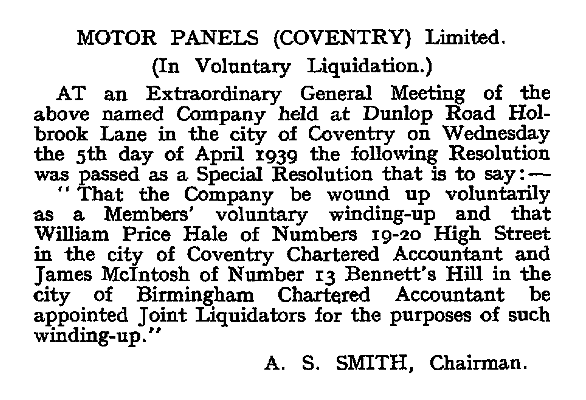
|
|
On 3rd September, 1939 the company
began to concentrate on war work, all civilian orders were
cancelled. Items produced by the company during the war
included aircraft fuel tanks, track shields for Churchill
tanks, body panels for ‘Scout’ cars, sea mines, anti
submarine projectiles, tail planes for Stirling aircraft,
refrigerator containers, and trailers. In order to fulfil
the Ministry orders, the company increased its workforce to
around 1,000.
Although Coventry was heavily bombed in
the early 1940s, the factory suffered comparatively little
damage, but in 1942 a serious fire destroyed nearly one
third of the factory.
|
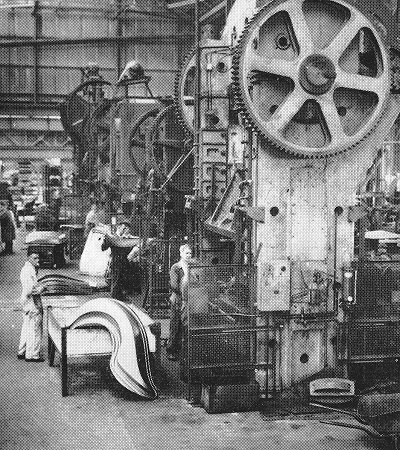
One of the firm's large presses.
From the autumn 1947 edition of the staff magazine
"Zeal". |
In April 1943 Motor Panels became a
member of the Owen Group, with Mr. P. J. Freeman as Managing
Director.
Through his efforts production greatly increased,
and many improvements were made in the factory. Sadly he
died in October 1944 and was greatly missed.
His successor,
James Milner Phillips, a brilliant automotive engineer
became famous in the 1960s when the Owen Organisation built
Donald Campbell’s record breaking Bluebird Proteus CN7 car.
Mr Phillips supervised the building and testing of the car,
and the record attempts in Australia. |
| After the war, the firm manufactured
body panels for many well known makes of car including
Jaguar, Armstrong Siddeley, Alvis, Daimler, Triumph, Austin,
and Wolseley, and also Morris vans.
The product range was
greatly extended to include kitchen and bathroom equipment,
metal clothes lockers, oil-fired electric radiators, dodgem
car bodies, and agricultural machinery.
It was hoped that
the wide product range would ensure that work would always
be available, so ensuring regular employment for the staff. |
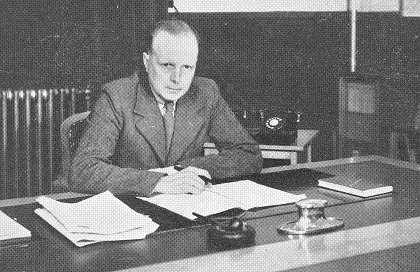
James Milner Phillips. From the
autumn 1947 edition of the staff magazine "Zeal". |
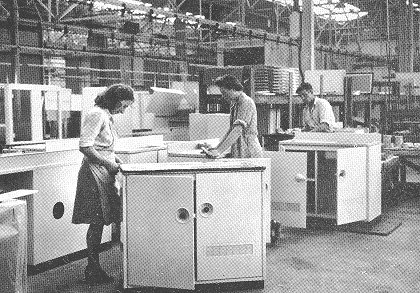
Kitchen units in production. From
the autumn 1947 edition of the staff magazine "Zeal". |
A well-equipped surgery was added,
under the supervision of a qualified nurse, and the Works
Benevolent Society provided financial aid for sick or
unfortunate employees.
The Social Club organised sports
and social activities for the staff, using facilities at
the sports ground at Britannia Works in Paynes Lane,
Coventry, owned by Henry Caton & Company (1936) Limited,
incorporated in October 1936.
It had also been taken over by the
Owen Group, and became Rubery Owen's Coventry Works.
|
|
Among the events organised by the
Social Club was the annual sports day when people
competed for the P. J. Freeman Memorial Cup, and various
inter-departmental trophies. There were amusements for
children, and fundraising activities for the Social
Club.
Sports activities included
football, table tennis, darts, and fishing, thanks to
the flourishing angling section.
All the employees were encouraged
to attend part-time courses at Coventry Technical
College, and were paid a bonus for passing exams.
|
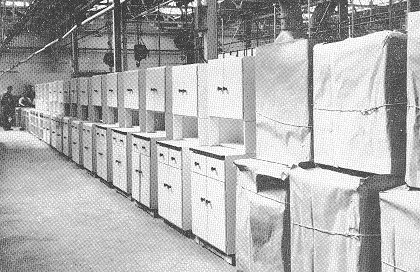
Completed kitchen units awaiting
despatch. From the autumn 1947 edition of the staff
magazine "Zeal". |
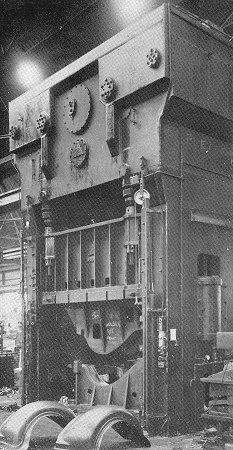
Another of the large presses. From
the summer 1950 edition of the staff magazine
"Goodwill". |
The factory was managed in a very modern way. There
were several committees which oversaw all aspects of
production and sales.
The Works Joint Management Committee which met every
three months, consisted of representatives from the
senior management team, and middle managers from every
department.
There were sub-committees, which met at least once a
month to sort out problems on the shop floor, and a
Supervisors' Discussion Group that met after work, once a week (once
a fortnight in the summer), attended by
members of management, all heads of department,
supervisors, and foremen.
Meetings included talks by specialists, film shows,
and the discussion of any problems in the factory.
All meetings were minuted, and copies of the minutes
were circulated to all departments discussed at a
meeting. In the 1970s, one of the firm's products was the
'Transcontinental' lorry cab. |
|
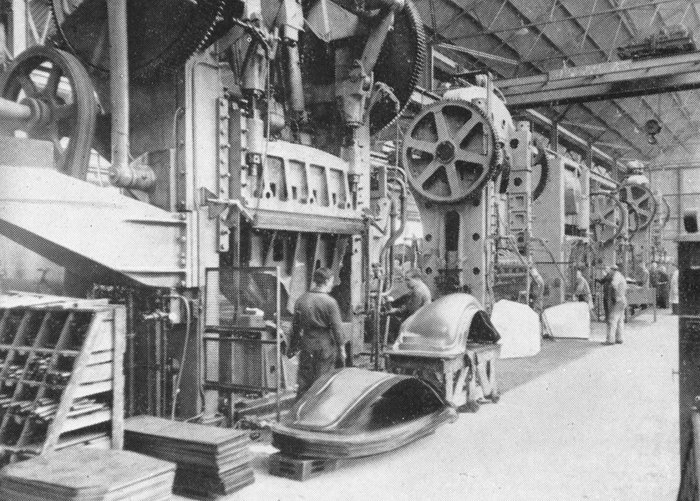
A corner of the press shop. |
|
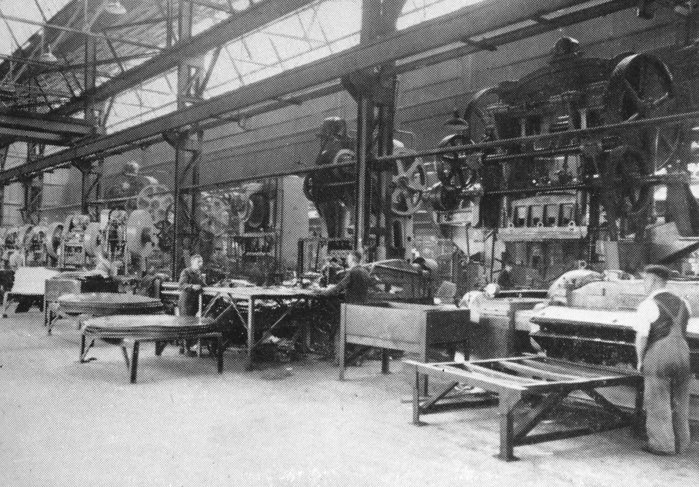
Another view of the press
shop. |
|
By 1980 it became the cab design and
manufacturing subsidiary of Rubery Owen, about 25
percent of turnover was from the design and supply of cab
manufacturing facilities to overseas companies. In 1991 administrative receivers were called-in, and
in 1995 the business went into final liquidation. |
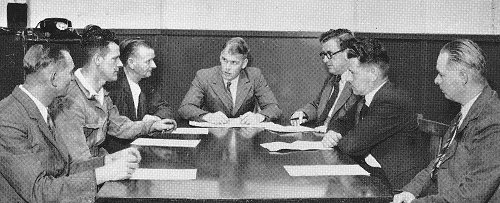
The tool section of the Joint
Production Committee. From the autumn 1947 edition of
the staff magazine "Zeal". |
|
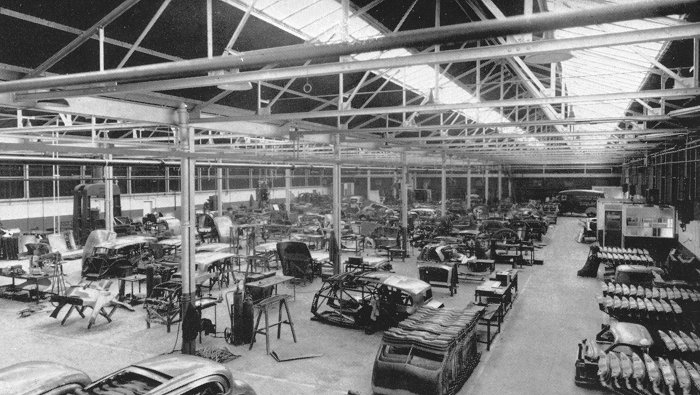
A corner of the factory. |
| At work on Triumph Tonneau car
bodies. From the autumn
1947 edition of the staff magazine "Zeal". |
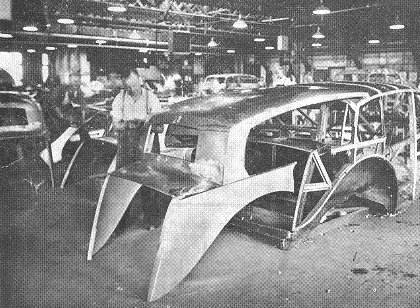 |
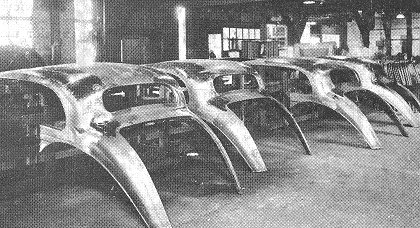 |
A bank of Armstrong Siddeley
car bodies awaiting despatch.
From the autumn 1947 edition of
the staff magazine "Zeal". |
 |
Return to
the
previous page |
|